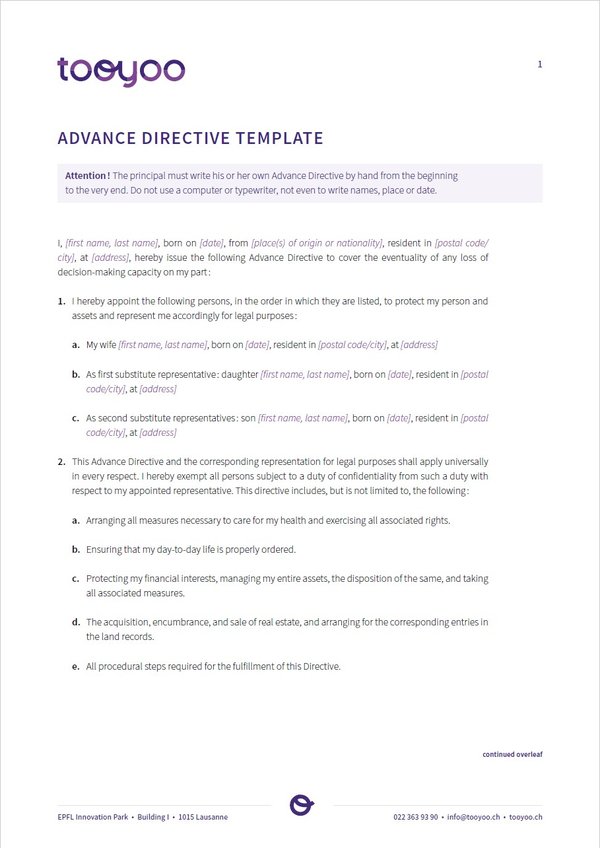

Whether you want to download a sample PDF template, draft your lasting power of attorney online, or simply obtain more information about what this piece of paper does, you’ve come to the right place.
Create you lasting power of attorney online, free of charge:
Our wizard will guide you step by step through the drafting of a personalised proxy form. Each stage is explained for you. The proxy form that we provide is valid throughout Switzerland.
Download template in PDF
Understanding the lasting power of attorney and how it works
-
What is a lasting power of attorney?
In Switzerland, the lasting power of attorney was introduced in 2013 in tandem with the new law protecting the rights of adults.
The lasting power of attorney is a special proxy arrangement. With this document, you can authorise other people to represent you legally in the event that you are no longer able to do so. In other words, you can yourself decide who will look after your affairs if you become mentally incapacitated so that your wishes are respected.
A new document was needed from a legal point of view, as existing powers of attorney, such as general proxies, essentially assume that the principal is still able to make reasoned decisions. Consequently, since the new law came into force in 2013, the lasting power of attorney has been the only legally valid form for cases of mental incapacity.
-
Whom can I appoint to represent me?
With a lasting power of attorney, you can appoint natural persons or legal entities (companies or organisations). It is also possible to designate substitute persons in case the attorney is unable or unwilling to perform the requested role at the given time. You may also appoint advisers whom the attorney must consult on important decisions.
-
General proxy powers, or need I be specific?
The lasting power of attorney generally covers:
- Health and welfare
- Property and financial affairs
- Legal representation with third parties
Depending on your wishes, you can limit the lasting power of attorney to specific areas or business, or add other remits. The lasting power of attorney may be general but, if necessary, it may also contain specific instructions on how the attorney is to perform their duties and whether they will receive remuneration for their services.
-
Differences between lasting power of attorney and patient decrees
Patient decrees allow you to designate a representative to answer questions about medical treatment if you are no longer able to do so yourself. You may also specify your wishes on specific issues such as organ donation.
Consequently, the role of medical representative in the patient decrees partly overlaps with the helper role in the lasting power of attorney. It is therefore advisable to designate the same person for medical representation, in the patient decrees, and personal assistance, in the lasting power of attorney.
For more information, see (French only):
Mandat pour cause d’inaptitude et directives anticipées : ce qu’il faut absolument savoir
-
What is mental incapacity and why create a lasting power of attorney?
In Swiss law, ‘discernment’ means that a person can make decisions for himself or herself independently and rationally. This inability may be temporary or permanent.
If you are no longer able to make decisions after an accident or due to illness, you need someone who can think for you. A lasting power of attorney is used to determine who will look after your affairs in your place, to what extent and in which areas specifically.
Lasting powers of attorney should be considered as part of our arrangements for old age. The aim is that we can decide issues for ourselves, as the risk of losing our ability to reason increases as a result of an illness or accident.
Spouses or civil partners do not require a power of attorney for basic assistance (e.g. medical decisions) or legal transactions (e.g. payment or insurance coverage) as they are automatically empowered to make that kind of decision. For the extraordinary decisions regarding property, however, even a spouse or a civil partner will require a power of attorney, e.g. buying or selling a home, a business or investment securities. Without a proxy, the adult and child protection authority (APEA) will assess a one or more persons to represent you.
You will require a power of attorney if:
- You want your spouse or civil partner to represent you in legal acts associated with extraordinary property-related decisions. If no lasting power of attorney has been established, authorisation must be obtained from the cantonal adult protection authority.
- If you wish to authorise a person other than your spouse or civil partner to represent you.
- If you are living with someone, widowed and do not wish to have a curatorship.
Parents commonly use the lasting power of attorney as a kind of proxy for the care and custody of their children. However, such an arrangement is not legally binding. In situations where parents lose mental capacity, child custody arrangements will in any case be assessed and decided on by APEA. It is nevertheless recommended to include childcare wishes in the lasting power of attorney. APEA will take such information into account in the decision-making process.
-
What legal form must lasting powers of attorney take?
At the time of writing a lasting power of attorney, the principal must have the capacity to act, i.e. be of age and capable of reasoned decisions. As regards the form, the following conditions must be met for a lasting power of attorney to be considered valid:
- Be written out by hand in full
- Be dated and signed (holographic form)
Having the lasting power of attorney notarised adds an additional layer of legal certainty because the notary will certify the principal’s ability to make reasoned decisions at the time of drafting. A lasting power of attorney authenticated by a notary no longer has to meet the formal handwritten requirement. This means that a printed version becomes directly legally binding through notarisation. Simply use our wizard to create your lasting power of attorney online, step by step, then request notarisation once you have finished.
-
Where can I keep my lasting power of attorney?
You can register the existence and place of safekeeping of your power of attorney with civic authorities. Registration costs CHF 75. All modifications or deletions from the register will again incur a fee of CHF 75.
It is also advisable to furnish the attorney with a copy of the power of attorney, for example by using a secure digital platform such as tooyoo. As such, the existence of the document is known and its content can be retrieved wherever you are, via your smartphone.
-
What’s the difference relative to a signing authority?
If a person is still capable of making rational decision but can no longer physically manage his or her affairs, then a signing authority is the best course of action. Banks, the Post Office, insurers, the state pension authority (AHV/AVS), healthcare insurers and tax authorities all have their own forms for this purpose. As such, even though the person may be affected by a gradual loss of physical and mental capacity, they can still act of their own volition for as long as possible.
